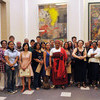UCT Law’s gaming app brings legislative learning to life
29 July 2024 | Story Azraa Dawood Photo iStock. Read time 4 min.
In an exciting development at the University of Cape Town (UCT), Associate Professor Cathleen Powell has spearheaded the creation of a gaming app designed to transform the way law students engage with the legislative process. The app, “Pass a Bill”, is currently available to Constitunional Law undergraduate students.
This innovative tool introduces a dynamic and interactive learning environment, which aims to deepen students’ understanding of complex legal procedures through immersive gameplay. The app challenges players to navigate a bill through the intricate pathways of legislative approval, making critical decisions at key junctures based on provided information. By simulating the real-life processes that bills undergo in South African Parliament – ranging through proposals from the National Assembly, scrutiny by the National Council of Provinces, and mediation where these bodies disagree – the game offers a hands-on learning experience that is both educational and engaging.
Associate Professor Powell’s inspiration for the app stemmed from a desire to alleviate the tedium often associated with traditional methods of studying law. “We aimed to create a learning tool that not only educates but also engages students in a way traditional methods have not,” she said. Recognising the potential for interactive technology to enhance learning outcomes, Powell envisioned a platform where students could apply theoretical knowledge in practical scenarios, thereby solidifying their understanding of legislative mechanics in a fun and accessible manner.
Powell explained: “The legislative process can seem distant and complex. Our app brings it into the students’ hands, making it accessible and interactive.”
Collaboration
The app’s development was driven by collaboration with experts in gaming and educational technology, ensuring a user-friendly interface that appeals to a generation of learners accustomed to digital interactivity. Through a series of challenges and scenarios, players are tasked with making technical decisions, reflecting the real-world complexities lawyers face when navigating legislative frameworks.
“Seeing students apply theoretical knowledge in practical, simulated scenarios has been incredibly rewarding.”
Initial feedback from students who have tested the app has been overwhelmingly positive, highlighting its effectiveness in making complex legal concepts more digestible and engaging. Powell noted, “Seeing students apply theoretical knowledge in practical, simulated scenarios has been incredibly rewarding.” As the app continues to evolve, there is potential for its application across various disciplines, indicating a promising future for game-based learning in higher education.
Allister Petersen, graphic designer and gaming app developer at the Centre for Innovation in Learning and Teaching (CILT), who led the project's development, shared his thoughts on the experience: “Creating this app was all about making something cool and useful. We wanted to make law fun and easy to get into, breaking down those big, complicated ideas into something everyone can grasp and enjoy playing with.”
Petersen added, “We put a lot of effort into testing the app, making sure it was both fun and educational. We played around with different scenarios to see how users would react. It was important for us to see the app through the students’ eyes, to ensure it was user-friendly and really hit the mark in teaching about the legislative process in an engaging way.”
The app was specifically developed for second-year law students studying the Constitutional Law module. Based on student feedback, continuous improvements and updates are being made to enhance its functionality and educational value. This ongoing development ensures the app remains relevant and effective in providing a modern educational tool that aligns with students’ needs and learning styles.
This initiative not only marks a significant leap forward in legal education at UCT but also sets a precedent for integrating technology into academic curriculums, demonstrating the immense potential of interactive learning tools to enhance student engagement and understanding.
 This work is licensed under a Creative Commons Attribution-NoDerivatives 4.0 International License.
This work is licensed under a Creative Commons Attribution-NoDerivatives 4.0 International License.
Please view the republishing articles page for more information.
Centre for Higher Education Development
In the news


.jpg)

































































































































































































































